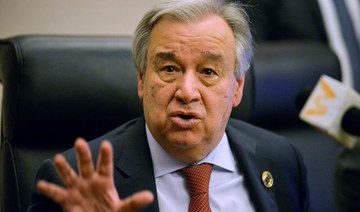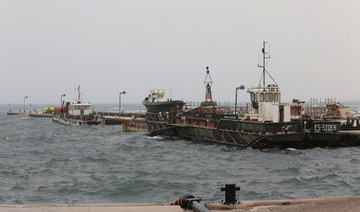CAIRO: A military buildup around the Libyan city of Sirte has raised fears of a major battle for control of the area’s strategic oil reserves.
The Libyan National Army (LNA), which has occupied Sirte since May, accused Turkey of targeting the oil-rich city and supplying militias in the area with weapons.
LNA spokesman Ahmed Al-Mesmari said that western Libya is under total Turkish control.
He said that Turkey aims to reach Libya’s “oil crescent,” a coastal region home to most of its oil export terminals.
The LNA is closely monitoring Turkey’s moves in Sirte and Al-Jufra, he added.
“We expect an attack on Sirte by Turkey and the militias at any time,” Al-Mesmari said.
His statement was confirmed a few days ago on a social media account affiliated with Turkey, which posted a map of areas under its control as well as the latest developments in Libya. The map showed areas under the control of Khalifa Haftar, LNA commander, and the Government of National Accord (GNA). It also featured arrows illustrating that Sirte and Al-Jufra are the next targets of the GNA, despite a no-fly zone on the area imposed by the LNA.
The developments led UN Secretary-General Antonio Guterres to warn on Wednesday against a military buildup near Sirte, which is located between the capital Tripoli and Benghazi.
The warning came after LNA troops led by Haftar retreated and GNA troops led by Fayez Al-Sarraj, prime minister of the GNA of Libya, advanced.
In a UN Security Council meeting chaired by Germany via video conference, Guterres said foreign interference in Libya had reached “unprecedented levels.”
He condemned the violation of a cease-fire in place since 2011, which also called for the handing over of advanced military equipment and a declaration of the number of mercenaries involved in the conflict. However, Guterres did not name the parties who violated the cease-fire.
Guterres called on Al-Sarraj and Haftar to engage in political negotiations and agree to a cease-fire.
During the conference, the representatives of Germany, the US and France warned Turkey about its involvement in Sirte.
Egyptian Foreign Minister Sameh Shoukry indirectly criticized Turkey for sending Syrian militants to Libya.
“The transfer of Syrian extremist militants to Libyan territories by one of the regional parties aggravates the situation in Libya. This issue is a serious threat to the security of the Libyans as well as neighboring Mediterranean countries,” he said.
Shoukry added: “These threats clearly and currently endanger Egypt, and we will not tolerate this type of threats which are close to our borders, at a time when foreign interferences provide those militants with support.”
He said: “Supporting extremism must stop. We have to put an end to the sources of support by regional players who are confirmed to care less about the stability of the Mediterranean region. Solving this problem and resisting such policies is a prerequisite for the success of our efforts to protect the future of our peoples and that of the Libyan people.”
Shoukry expressed Egypt’s concern regarding the deployment of what he labeled “terrorist groups” west of Libya, with Daesh presenting the greatest potential threat. He said he considered such a deployment a threat to the security and stability of Egypt.
Egyptian President Abdel Fattah El-Sisi suggested that any violation of Sirte and Al-Jufra will push Egypt to intervene in accordance with international norms and conventions.
Egyptian military expert Samir Farag said that oil is the main reason behind Turkish President Recep Tayyip Erdogan’s interference in Libya. Farag said that Sirte and Al-Jufra are Erdogan’s two main goals in controlling Libya’s “oil crescent.”
Farag said: “Erdogan knows very well the competence of the Egyptian forces and is afraid of facing them. President El-Sisi said that Sirte and Al-Jufra are red lines.”
He added that if Turkey interferes in those areas, “there will be a strong reply.” He said the Egyptian Air Force is ready and capable of reaching any place which poses a threat to Egyptian national security.
Farag hailed the French role in the Libyan crisis. He said a speech by the French representative during the Security Council meeting on Libya was clear and strong.
“Erdogan faces a difficult situation internally and externally,” Farag said, adding: “Perhaps NATO would adopt resolutions on preventing Turkey from using military coordinates.”
Mohamed El-Ghobary, former director of the Egyptian National Defense College, said Libya has become “an international venue for conflict that is not only regional.”
“The whole world agreed that Sirte is a red line and that whoever crosses that line is an aggressor,” he said.
El-Ghobary added that Sirte is in the middle of Libya and controls the transfer of oil from south to north, and that Turkey aims to deploy there because of this. But Egypt would not allow this, he said.
“Egypt has a development plan that requires it not to slip into any potential losses,” he said.
The Egyptian leadership has a military strategy and political ideology. Any intervention will be “accurately calculated,” El-Ghobary said.
Battle looms for key Libyan city Sirte
https://arab.news/9zckt
Battle looms for key Libyan city Sirte
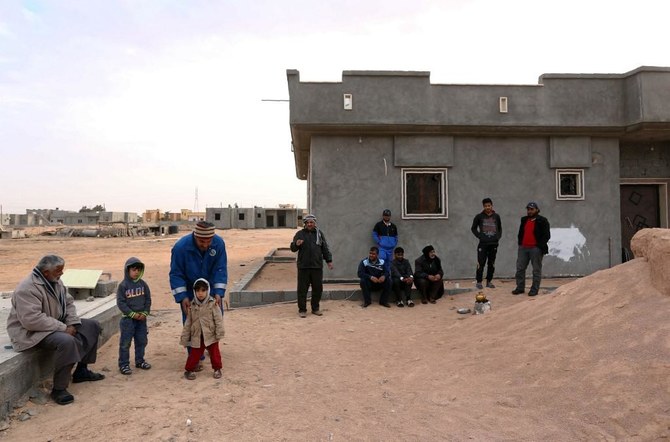
- LNA spokesman Ahmed Al-Mesmari said that western Libya is under total Turkish control
- “We expect an attack on Sirte by Turkey and the militias at any time,” he said
Saudi officials reveal details of highly-anticipated ‘Zarqa Al-Yamama’ opera
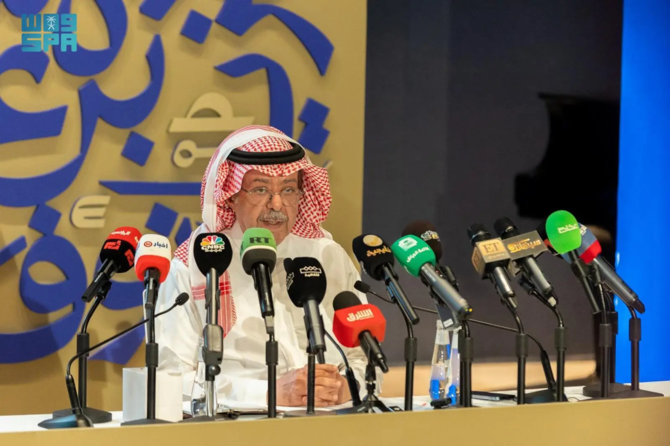
RIYADH: Saudi officials on Thursday revealed details of performances of “Zarqa Al-Yamama,” the first Saudi opera and the largest to be performed in the Arabic language.
The opera opens on April 25 and will run until May 4 at the King Fahd Cultural Center in Riyadh, the Theater and Performing Arts Commission announced at a press conference.
Sultan Al-Bazei, the CEO of the commission, said: “The ‘Zarqa Al-Yamama’ opera represents a new phase for Saudi culture, in which the most famous stories of our narrative and cultural heritage are embodied on the theater stages with qualitative works according to the highest international standards.”
He added that the new production is the result of years of work, and all its details were developed with great care and hard work.
He expressed appreciation for the follow-up and attention given by Minister of Culture Prince Badr bin Abdullah bin Farhan, who is also the chairman of the board of directors of the Theater and Performing Arts Commission.
Prince Badr announced the launch of the opera on Feb. 16 at a ceremony in London, which was attended by the Saudi and international creatives participating in the opera’s production.
Al-Bazei said that “Zarqaa Al-Yamama” derives its story, spirit and language from the cultures of the Arabian Peninsula.
The opera “in some way embodies a bloody tragedy, depicting ancient history and at the same time symbolizing the sorrows of the contemporary man in the world, without being devoid of the specter of hope that heralds a bright and prosperous tomorrow,” Al-Bazei explained.
He added that the first Saudi opera will include prominent names in the Saudi music scene, most notably the author of the text, Saleh Zamanan, and the participation of a number of Saudi artists in the show.
Al-Bazei said the Dresden Sinfoniker Orchestra will perform the musical pieces of the opera, and the Czech Philharmonic Choir will accompany the events of the story with distinctive vocals, while Swiss director Daniele Finzi Pasca will undertake the task of directing all the details of the opera.
International operatic composer Lee Bradshaw put together the tunes for this epic story, drawing inspiration from some traditional elements to create a contemporary framework.
The commission announced during the press conference the main partners are the Roshan Group and the King Fahd Cultural Center.
It also honored other official partners including Banque Saudi Fransi, Saudi Signs Media and Genesis Motor, and sponsors including Nova and Spirit of Saudi Arabia, and hospitality partners Bateel and Ramada by Wyndham.
Through the opera, the Theater and Performing Arts Commission aims to strengthen the Saudi cultural sector, highlight national talent, and reproduce and revive famous works and stories inherited from the Arabian Peninsula in a contemporary and creative form.
It also aims to enhance international cultural exchange, as one of the goals of the National Strategy for Culture derived from the Kingdom’s Vision 2030.
Pakistan stocks close at record high amid IMF talks, tensions in Middle East
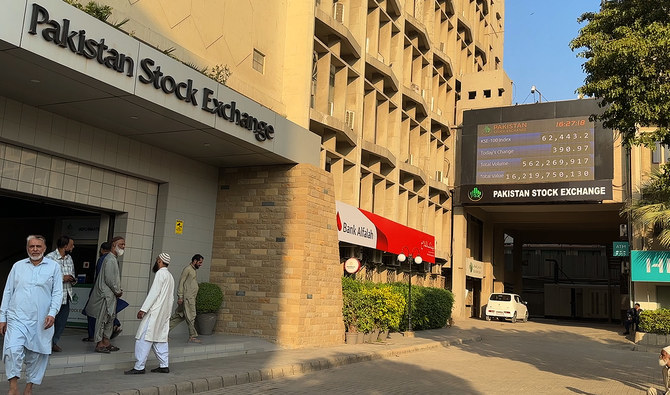
- The benchmark KSE-100 index surged by 647 points after morning trading hiccups due to reports of Israel’s attack on Iran
- Pakistani analysts say escalating tensions in Middle East will impact supply chain and increase import bill for Pakistan
KARACHI: Pakistan’s stock market recorded on Friday its highest-ever closing at 70,909 points, stock brokers and analysts said, attributing it to ongoing talks with the International Monetary Fund (IMF), but cautioning about potential economic impact of Israel-Iran tensions in the Middle East.
Explosions were heard in Iranian city of Isfahan on Friday that were described as an Israeli attack by western media. However, Tehran has not officially confirmed the development as its response remains muted.
The Pakistan Stock Exchange witnessed some nervousness in the morning trading session, when news of Israel’s attack on Iran came in. But despite the development, the benchmark KSE-100 index surged by 647 points to close at 70,909 points.
“When news of the attack on Iran came this morning, its impact was seen in the Asian and European markets at one point,” Shehryar Butt, portfolio manager at the Karachi-based Darson Securities, told Arab News.
“Nikkei saw a decline of more than a thousand points, but despite this, the Pakistan Stock Exchange performed much better.”
The Pakistani bourse has recently been trading at record highs amid positive sentiment prevailing among investors due to hopes of the country’s successful talks with the IMF.
“The basic reason for this is that Pakistan is currently in the IMF program, and very serious discussions are taking place in Washington at this time,” Butt said.
Pakistan’s finance minister, Muhammad Aurangzeb, is currently in Washington to hold talks with IMF officials for a new long-term loan program as Pakistan’s current $3 billion program is due to expire this month. The finance minister has expressed his hopes that the outline of the new program will be agreed next month.
Pakistan is expected to demand a loan size of around $7 billion but Jihad Azour, the IMF Middle East and Central Asia Director, said on Wednesday the reform package was more important than the size of the program.
“I would say the package of reform is now more important than the size of the program because we saw recently that the right measures provided the right response,” Azour said at a press briefing.
The surge in global oil prices amid geo political tensions and the Pakistani rupee’s recovery played “a catalyst role in Friday’s record close,” according to Ahsan Mehanti, CEO of the Arif Habib Corporation.
Though Pakistan’s market downplayed the Middle East tensions, but analysts said if the situation escalated, it would disrupt supply chain and impact Pakistan’s economy.
“The conflict between Iran and Israel will affect the Pakistani economy, quite a negative effect will be seen on the Pakistani economy because immediately after that, we saw geo-political situation worsening and oil started to rise,” Butt said, adding the rising global oil prices would impact Pakistan’s import bill.
Pakistan has imported petroleum products worth $12 billion during the July-March period of the current fiscal year, including $3.9 billion worth of crude oil and 2.9 billion worth of liquefied natural gas (LNG), according to official data.
Butt feared that if the situation persisted, then the attention of Saudi Arabia would also be drawn to the Middle East and the investment commitments made by the Kingdom with Pakistan could be delayed.
Haroon Sharif, an economist and former chairman of the Pakistan Board of Investment, said if the tensions in the Middle East escalated, their first impact would be on the stock market as foreign investors would like to shift their capital to safer markets.
“Another impact would be oil price escalation, hitting Pakistan’s trade deficit and traveling and cargo price would also escalate, increasing the cost of doing business,” Sharif said, adding that investors would hold their future expansion and investment plans till situation becomes stable.
Husain Haqqani, a former Pakistani ambassador to the United States and scholar at Washington DC’s Hudson Institute, said a prolonged conflict between Iran and Israel would increase uncertainty and instability across the Middle East.
“If Iran’s drone and missile attack on Israel was meant to show Iran’s reach, Israel has demonstrated its ability to strike deep inside Iran,” Haqqani told Arab News.
“Iran has several proxies that it can use while Israel has tremendous military and intelligence capabilities. Leaders of both countries have domestic political reasons to not be forgiving toward one another.”
Haqqani said the US would likely restrain Israel, while Iran would be constrained by its limited capability.
“After all, even after attacking with hundreds of missiles and drones, Iran was unable to cause real damage on ground in Israel,” he added.
After Pakistan alert, WHO likely to issue wider warning on contaminated J&J cough syrup

- The UN health body said it puts out global medical product alerts to ‘encourage diligence’ by authorities
- The WHO this week sent out alert on five batches of contaminated cough syrup ingredients found in Pakistan
LONDON: The World Health Organization is likely to issue a wider warning about contaminated Johnson and Johnson-made children’s cough syrup found in Nigeria last week, it said in an email.
Nigeria’s regulator recalled a batch of Benylin paediatric syrup last Wednesday, having found a high level of diethylene glycol in the product during routine testing.
The contaminant, alongside another closely related toxin, ethylene glycol, has been linked to the deaths of more than 300 children in Cameroon, Gambia, Indonesia and Uzbekistan since 2022, though there is no evidence that these incidents are linked with the latest recalls.
The UN health body said it puts out global medical product alerts to “encourage diligence” by national authorities and was likely to do so in this instance, “subject to confirmation of certain details from parties.”
The recalled batch of Benylin syrup was made by J&J in South Africa in May 2021, although Kenvue now owns the brand after a spin-off from J&J last year.
J&J has referred requests for comment to Kenvue. In an emailed statement on Friday, Kenvue said it had carried out tests on the batch recalled by Nigeria and had not detected either diethylene or ethylene glycol.
“We continue to work closely with health authorities and the WHO and are engaging with NAFDAC to understand their test results, including verifying the authenticity of the sampled product, the testing methodology used, and results reported by the agency,” the statement added.
Since Nigeria’s recall, five other African countries have also pulled the product from shelves — Kenya, Rwanda, Tanzania, Zimbabwe and South Africa, where the drug was made.
South Africa’s regulator has also recalled another batch of the syrup, which is used to treat coughs, hay fever and other allergic reactions in children.
Diethylene glycol is toxic to humans when consumed and can result in acute kidney failure, although there have been no reports of harm in the latest incident.
RAW MATERIALS
In the 2022 cases, the contamination in the syrups came from the raw materials used by manufacturers in India and Indonesia.
The WHO said it was collaborating with both the manufacturer and regulatory authority in South Africa to investigate the Benylin paediatric syrup, and had information on the source of the ingredients used. Kenvue has previously said it tested its ingredients before manufacture.
The agency said the possibility that the syrup was counterfeit was also “under consideration as part of investigations.”
Earlier this week the WHO sent out a separate alert on five batches of contaminated cough syrup ingredients found in Pakistan that appeared to have been falsely labelled as Dow Chemical products.
It was the first alert the WHO has sent on excipients — elements of a medicine other than the active pharmaceutical ingredient — rather than finished products, the agency confirmed on Friday.
The batches of propylene glycol were contaminated with ethylene glycol.
“It was critical for WHO to also alert manufacturers that may have been procuring this material to exercise more caution,” a WHO spokesperson said by email.
Propylene glycol is not an ingredient in Benylin paediatric syrup, a Kenvue spokesperson said on Friday.
Death toll from heavy rains in northwest Pakistan rises to 39
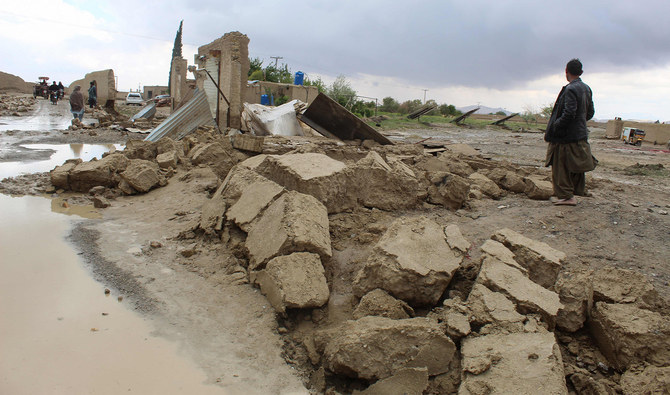
- The rains that began last Friday have damaged 2,391 houses across the northwestern Khyber Pakhtunkhwa province
- In southwestern Balochistan province, heavy rains have killed 15 people, triggered flash floods in several areas
PESHAWAR/QUETTA: The death toll from continuing rains in Pakistan’s northwestern Khyber Pakhtunkhwa (KP) province has risen to 39, while another 54 people have been injured in various incidents, the KP Provincial Disaster Management Authority (PDMA) said on Friday.
The rains that began last Friday have caused damages to 2,391 houses in several districts across the province, according to the PDMA.
Khyber, Dir Lower and Upper, Chitral Upper and Lower, Swat, Shangla, Bajaur, Malakand, Karak and Tank districts have been declared the most affected by the downpours.
“As many as 23 children, eight men and eight women are among those died in rain related incidents during the last eight days,” the PDMA said in a statement on Friday.
The current spell of showers, which began on April 17, was likely to continue till April 21, the PDMA said this week.
The provincial government has released Rs110 million to be distributed among the affected families and dispatched aid, including tents, kitchen kits, blankets, hygiene kits, mosquito nets and mattresses, to the affected areas, according to the authority.
As the rains were expected to continue intermittently until April 21, the PDMA said it had already a letter to administration of all districts to remain alert and take precautionary measures.
In the southwestern Balochistan province, heavy rains have killed 15 people since Friday and triggered flash floods in several areas, according to provincial authorities.
Balochistan Chief Minister Sarfaraz Bugti said climate change had become a “challenge” for the provincial government.
“Current rains are unusual which were never reported in a thousand years,” he told reporters on Friday. “The government has been helping the masses with available resources and our teams have reached all districts to help the people affected by rains and floods.”
Pakistan has received heavy rains in the last three weeks that have triggered landslides and flash floods in several parts of the South Asian country.
The eastern province of Punjab has reported 21 lighting- and roof collapse-related deaths, while Balochistan, in the country’s southwest, reported 10 deaths as authorities declared a state of emergency following flash floods.
In 2022, downpours swelled rivers and at one point flooded a third of Pakistan, killing 1,739 people. The floods also caused $30 billion in damages, from which Pakistan is still trying to rebuild.
Court orders release of prominent Palestinian professor suspected of incitement
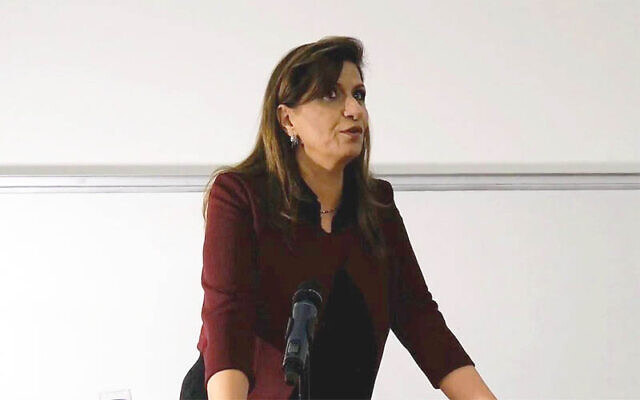
- Nadera Shalhoub-Kevorkian was under investigation after questioning Hamas atrocities, criticizing Israel
- Insufficient justification for arrest, says court
- Detention part of a broader campaign, says lawyer
LONDON: The prominent Hebrew University of Jerusalem professor, Nadera Shalhoub-Kevorkian, was released on Friday after a court order rejected police findings.
The criminologist and law professor was arrested the previous day on suspicion of incitement. She had been under investigation for remarks regarding the Oct. 7 attacks by Hamas and for saying Israelis were committing “genocidal crimes” in the Gaza Strip and should fear the consequences.
On Friday, the court dismissed a police request to extend her remand, citing insufficient justification for the arrest, according to Hebrew media reports.
Protesters gathered outside the courthouse to demonstrate against Shalhoub-Kevorkian’s arrest.
Israeli Channel 12, which first reported the news, did not specify where Shalhoub was arrested but her lawyer later confirmed she was apprehended at her home in the Armenian Quarter of Jerusalem.
“She’s not been in good health recently and was arrested in her home,” Alaa Mahajna said. “Police searched the house and seized her computer and cellphone, [Palestinian] poetry books and work-related papers.”
Mahajna described Shalhoub-Kevorkian’s arrest as part of a broader campaign against her, which has included numerous threats to her life and of violence.
The professor was suspended by her university last month after calling for the abolition of Zionism and suggesting that accounts of sexual assault during the Hamas-led attacks on Israel were fabricated.
The suspension was initially criticized by the university community as a blow to academic freedom in Israel. However, the decision was later reversed following an apology from Shalhoub-Kevorkian and an admission that sexual assaults took place.
Since hostilities began last year, numerous dissenting voices in Israel have faced arrest for expressing solidarity with victims of the bombardment in Gaza.
In October, well-known ultra-Orthodox Israeli journalist Israel Frey was forced into hiding following a violent attack on his home.
Bayan Khateeb, a student at the Technion-Israel Institute of Technology, was arrested last year for incitement after posting an Instagram story showing the preparation of a popular spicy egg dish with the caption: “We will soon be eating the victory shakshuka.”



